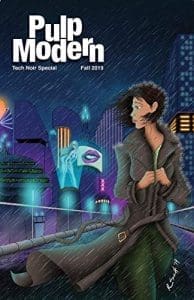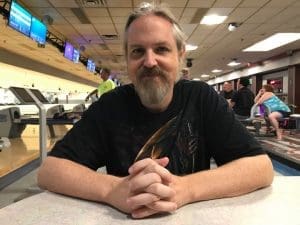Publisher Interview – Pulp Modern: Alec Cizak
 Interview with Alec Cizak, publisher of Pulp Modern
Interview with Alec Cizak, publisher of Pulp Modern
It was an era of bigger-than-life heroes, imaginative villains, sexy sirens, and hard-boiled detectives. The public consumed pages and pages of adventure, horror, and tantalizing mystery. No subject was too lurid or sensational. Pulp Fiction magazines teased readers in the first half of the 20th Century and the genre got its name from the rough, low-quality paper it was printed on. Alec Cizak has brought some of this literary daring back with his magazine Pulp Modern, and agreed to talk with me about his passion and publication. You can find the current issue, Pulp Modern: Tech Noir for sale now on Amazon. It is a special edition of futuristic crime stories in collaboration with the crime fiction journal Switchblade.
AF: What do you do as a day job?
AC: I teach lit and composition to pay the bills. I’m lucky to have a wife with a much more marketable skill. Between her salary and the pittance my salary as a part time professor provides, we don’t have to live on the street. I wish I made my money writing pulp fiction, but I was born at the wrong time in history for that!
AF: What motivated you to start up your small press?
AC: I started publishing Pulp Modern because I didn’t see any journals at the time that brought the major genres together. I also didn’t see any big-time publications publishing riskier stories, so I felt there was a need for a market that could take chances since no advertising dollars were on the line. That’s not a slam on the majors, by the way. I understand they are beholden to advertisers who may not want to be associated with gut-honest stories about junkies, pimps, and hookers. As time went on and the bulk of the original underground pulps that were big at the end of the last decade and the beginning of this decade (Thuglit, Beat to a Pulp, Twist of Noir, Crime Factory, Pulp Metal, etc.) either folded or became much more low-key, I continued publishing Pulp Modern because it provided a place for new writers to get their work in print. I suppose it’s become something like a farm team in baseball. Writers get their work in Pulp Modern and then move on to get agents and contracts with the Big Five and all that good stuff. Of course, now we seem to be in a silver age for this movement, with journals like Switchblade, EconoClash Review, Tough, and Broadswords and Blasters providing a new generation of markets.
 AF: How long have you been publishing and how many anthologies have you produced?
AF: How long have you been publishing and how many anthologies have you produced?
AC: I started publishing the work of other writers in 2010, at a blog called All Due Respect. That was taken over by Chris Rhatigan when I started Pulp Modern. Rhatigan, of course, has turned ADR into an independent powerhouse. To date, I’ve published fifteen editions of Pulp Modern–a first run of ten issues that ended in 2016, and a second (and current) run that started in 2017 when I asked Richard Krauss (publisher of The Digest Enthusiast) to take over art direction duties. The results have been stunning.
AF: Is there any profit margin?
AC: Nope. This is, financially, a losing venture. The recent Tech Noir issue cost about six hundred dollars to produce. It’s generated about fifty dollars in sales and I doubt that number will even double. This is a labor of love. The independent pulp fiction community has had lags over the last ten years or so, moments where there were almost no markets for new writers, and I’ve gone through periods where I thought I would quit, but enough people would write to me and insist I keep Pulp Modern going that I gave in every time and got back to it. There are many, many writers out there. Some of them are really good and they don’t have connections in the publishing world. A journal like Pulp Modern is there to make sure those unheard voices are heard.
AF: What are your plans for your press in the future?
AC: Funny you should ask. I’m expanding Uncle B. Publications to a “regular” book publisher. I will be working with David Cranmer (Beat to a Pulp) to produce a nice, single-volume collection of all the Drifter Detective novellas. I’m also putting together several charity anthologies, including a collection called Naptown Noir that will benefit the Indiana Literacy Association. Call me naive, stupid, or optimistic, I believe a population that reads is a population that thinks and that, more than anything, will turn this world back in a positive direction.












Great interview. History will cast Cizak as a hero. His distasteful critics will be properly portrayed as fascists and hypocrites.